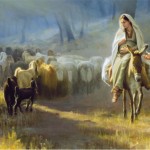Imagine the confusion of the young mother.
 Nine months before, her life had been interrupted by an angel. He said she would conceive a child and that he would be the Son of God. He was the Messiah–king of the earth. When her fiance had not believed her, he had been visited by an angel.
Nine months before, her life had been interrupted by an angel. He said she would conceive a child and that he would be the Son of God. He was the Messiah–king of the earth. When her fiance had not believed her, he had been visited by an angel.
Now they were stranded in Bethlehem. Luke’s account of the birth tells us that she and her husband, Joseph, had traveled to this small hamlet to register to pay taxes. While they were there, it came time for her to give birth. But there was no room. No place to stay. No vacancies in the inns.
I can imagine Joseph searched frantically to find a place–any place that Mary would be comfortable. Any room off the streets and away from preying, curious eyes. Finally, he knocked on one door and the innkeeper offered them the stable. Joseph looked down at Mary with hope in his eyes.
She was scared and confused. Would the king of the world, Israel’s long-awaited Messiah be born in a stable? Joseph wondered, What could Mary say? She had to get out of the streets, but a stable? Homeless and weary, Joseph escorted Mary to the small structure behind the inn. “Where will we put the baby?” Mary asked. Her voice filled with tears and deep, strained emotion. “There is nothing here but a manger?”
Without a word, Joseph positioned the manger close to her as she lay down on the hay. Knowing that there was no other choice, she pleaded, “No, Joseph, the animals lick that thing. We can’t put the baby in there.” The long trip and nights sleeping outside had taken its toll on this young mother. She was bone weary and her child would come tonight. He would be born in a stable; and she would wrap him in swaddling cloths and lay him in the manger.
For Mary, the depth of her emotions flowed from the uncertainty of the moment and the inconvenience of this place. Her mind must have raced, What have we done wrong? Why has this happened? Did I sin? Did Joseph and I sin? What did we do to bring us to this place? How can I allow the Messiah to be born in a stable?
Within moments, the contractions and exhaustion replaced all thoughts of place and time. Then, as the baby was born, Mary saw the most beautiful child she could ever imagine. Strong, healthy and as radiant as the first morning light. Now, he consumed her thoughts and heart. Yet, the whispers of doubt kept trying to sweep through her mind.
 Then a quiet knock and several shepherds crept into the stable. Bowed reverently, they spoke in excited whispers about the swaddling cloths. “Beg your pardon, Ma’am,” they said with awe through their Bethlehem accents. Slowly, they told the story of a night spent on the hilltop keeping their sheep and angels–a multitude–too many to count. “Peace on earth. Good will to men of God,” the angels had said.
Then a quiet knock and several shepherds crept into the stable. Bowed reverently, they spoke in excited whispers about the swaddling cloths. “Beg your pardon, Ma’am,” they said with awe through their Bethlehem accents. Slowly, they told the story of a night spent on the hilltop keeping their sheep and angels–a multitude–too many to count. “Peace on earth. Good will to men of God,” the angels had said.
How could Mary understand that this child had to be born in a lowly estate so that every person would know that he was like them–even in his birth.
As we minister to people with disabilities, they have questions that often cannot be answered. But some of them can be answered. Did God make a mistake when he made me? Did I sin to cause my disabilities? Did someone else sin? Will God reject me because of how I was born?
The Christmas promise tells us that God does not make mistakes. Our members weren’t a mistake. Their sin didn’t cause their intellectual disabilities. God made them; and when they accept Jesus as their Savior, they are made perfect in God’s sight.
Confusion can be erased in the hearts of people who know the Lord, especially within our sub-culture. God doesn’t make juke. He makes perfection.

